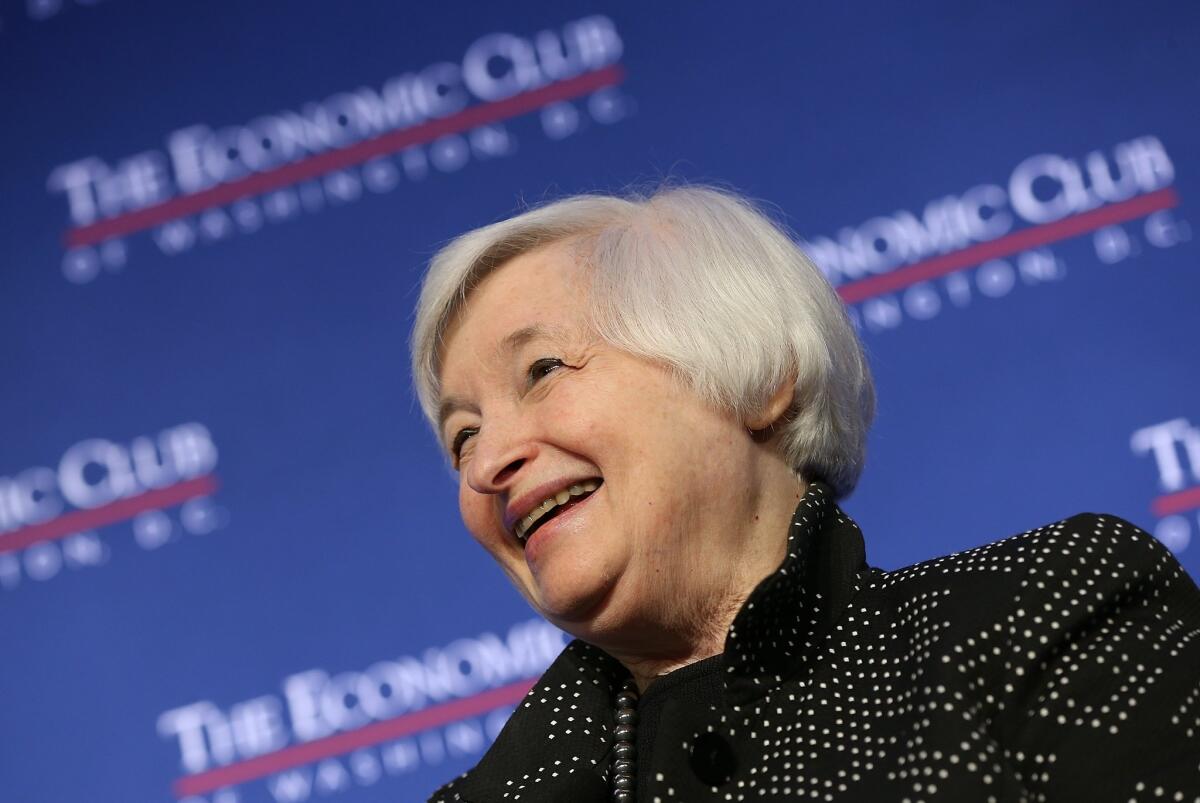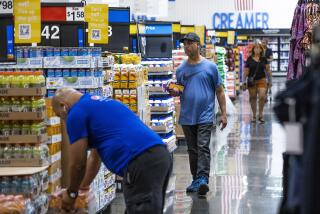Yellen signals rate hike is coming later this month

Federal Reserve Board Chairwoman Janet Yellen answers questions after delivering remarks on the U.S. economy.
Federal Reserve Chairwoman Janet L. Yellen, saying the U.S. economy has come a long way since the Great Recession, gave clear signals Wednesday that the central bank was likely to raise interest rates this month.
In a highly anticipated speech in Washington, Yellen said the Fed had made good progress in meeting its two objectives, maximizing employment and controlling inflation. Her remarks reinforced widespread expectations that policymakers would announce their first rate hike in nearly a decade at the end of their two-day meeting Dec. 15-16.
She cautioned, however, that there were still more economic data to be released before the Fed’s next meeting, most importantly the November jobs report this Friday. Analysts are expecting another month of solid job gains, near this year’s average of 200,000, and the jobless rate to remain at 5%, which many consider to be close to full employment.
A report Wednesday by the payroll firm Automatic Data Processing buttressed that forecast as its survey found that private sector employers had accelerated their hiring last month, adding 217,000 net new jobs. Separately, the Fed’s so-called beige book, an anecdotal report of economic activity nationwide, said that nine of the Fed’s 12 regional banks reported modest or moderate growth from early October through mid-November.
That is consistent with the “moderate pace” of economic growth that Yellen projected Wednesday for the foreseeable future. She said that should be enough to generate further gains in the job market and lift what has been an unusually low inflation rate over the last three years to the Fed’s 2% target.
See the most-read stories this hour >>
“On balance, economic and financial information received since our October meeting has been consistent with our expectations of continued improvement in the labor market,” Yellen said at the Economic Club of Washington. “Continuing improvement in the labor market helps strengthen confidence that inflation will move back to our 2% objective over the medium term.”
The Fed has held its benchmark interest rate near zero since late 2008, and a rise in that short-term financing cost for banks will mean the end of an era and the start of what is expected to be gradual increases that will raise borrowing rates for households and businesses.
“We don’t expect any major disappointment over the next two weeks, so we have to assume that a rate hike is coming,” said Paul Ashworth, an analyst at Capital Economics.
For months analysts and investors around the world have been anticipating an imminent rate hike. Fed officials held off at their last meeting in late October in good part because of concerns about the slowing global economy, which have eased since then. In her remarks Wednesday, Yellen said that China’s economic slowdown, a particular focus of concern, probably would “continue to be modest and gradual.”
John Williams, president of the Federal Reserve Bank of San Francisco and a voting member of the policymaking committee this year, described the decision in October as a “close call.” Since then, he and several other top Fed officials have expressed satisfaction with the economic expansion and have suggested that they are ready to vote for a rate hike in December.
Besides the global economic slowdown, Fed officials have been cautious about raising rates — too cautious, in the eyes of some policymakers — because they believe that the labor market is not as strong as the jobless rate might suggest. Yellen noted Wednesday that there are still nearly 2 million people who want to work and are available but haven’t been searching for a job, some of whom could be drawn back into the labor force in a stronger job market. Moreover, she said, there are many people now working part-time who want full-time jobs.
Inflation, meanwhile, has continued to run well short of the Fed’s target rate of 2%, dragged down by low oil prices and the strong dollar, which has made imported goods cheaper. Yellen reiterated Wednesday, however, that she expected inflation to move up to the Fed’s target in the months to come. As the job market has tightened, there have been recent signs of a step-up in wage gains, which is likely to boost inflation.
The U.S. economy is now in its seventh year of recovery since the Great Recession. Although the pace of growth has continued to be moderate, a little over 2% a year, the U.S. economy is outperforming other advanced economies and has been impressive in generating a steady, solid flow of new jobs. That has helped support consumer spending — which drives the American economy — even as manufacturing has turned down because of declining exports and the strong dollar, and investments in the energy industry have weakened with the decline in oil prices.
MORE FROM BUSINESS
U.S. health spending hits $3 trillion as Obamacare and rising drug costs kick in
Yahoo stock jumps 6% after report says it’s considering sale of core business
Shopper traffic at Best Buy, J.C. Penney soars on Black Friday
More to Read
Inside the business of entertainment
The Wide Shot brings you news, analysis and insights on everything from streaming wars to production — and what it all means for the future.
You may occasionally receive promotional content from the Los Angeles Times.











